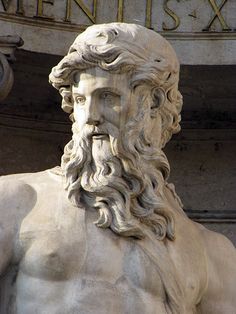Who was Uranus?

Two of the earliest false color images or Uranus taken by the Hubble telescope on July 28, 1997. (Image: NASA/JPL/STScl)
While reading Dava Sobel’s book The Planets last week, I realized that of all of the planets, I probably know the least about Uranus. Not just because we don’t know that much about Uranus. I wish I could blame it on that.
No, it’s because for me, Uranus has an unpronounceable name. One either has to say the to-my-ears ugly ur-un-us, or go with the borderline disreputable ur-ray-nus. To talk about the planet, I have to make a snap decision between enduring dissonance or discomfort. Most of the time, I choose to endure neither, and simply avoid asking any questions about Uranus at all.
(Some days, I can barely even endure saying the word in my head, much less speak it out loud.)
But there was no avoiding Uranus while reading Sobel’s book. She has an entire chapter devoted to it. And in that chapter, she mentions off-hand that while the other planets are named after Roman gods, Uranus was named after a Greek myth. I didn’t know the story of Uranus off-hand, and Sobel didn’t deign to tell it.
My mind, sadly, couldn’t let it go. So I decided to look it up.
Who was Uranus?
(In my own defense, while researching this post I looked up what Edith Hamilton’s Mythology — the reference text of my childhood — had to say about Uranus. He appears in a genealogy chart as the husband of Gaea and the father of the Titans, but otherwise Hamilton has very little to say about him. When she tells his story on pages 66-67, she calls him Father Heaven, with the exception of one instance, in which she calls him Ouranos. Even the Index merely lists Uranus as the father of Cronus. No wonder my high school self didn’t pick up on it.)
In the beginning, Greek mythology states, there was Gaea, Mother Earth. Although Gaea herself was born spontaneously either out of Chaos or nothingness, depending on who is telling you this ancient Grecian story, she found that in herself she was not sufficient. She created a partner for herself, Uranus, Father Sky, and married him. Out of their union came the Titans, who would go on to become the parents of the much more familiar to us Olympians.

By all accounts — or at least, by all the accounts that actually mention him — Uranus was a terrible husband and a worse father. According to Hamilton, the first few of his children with Gaea had a hundred heads and fifty heads – each. Uranus couldn’t stand the sight of these monsters, so as soon as they were born, he shoved them deep back into Mother Earth. Multiple times he did this, causing Gaea extreme pain. (The three Cyclops and the Titans which followed he allowed to roam free.)
Unable to bear the agony of holding her many-headed and many-handed children in her womb any longer, Gaea created an adamantine sickle and begged her free-ranging Titan and Cyclops children to use it to destroy their father. Only Cronus was brave enough to actually attack Uranus and overthrow him. Cronus then crowned himself king of the gods.
Being a terrible father and a worse husband apparently ran in the family. Having heard that one day one of his kids would overthrow him, Cronus proceeded to eat all of his kids, except for Zeus. Cronus’ wife Rhea, in despair over the deaths of her previous children asked Gaea for advice when Zeus was born. (Gaea, after all, knew a thing or two about dealing with murderous husbands.) Gaea told Rhea to replace baby Zeus with a stone, and to trick Cronus into eating the stone instead of his newborn son. Somehow this plan worked. Zeus grew up in hiding and ultimately displaced Cronus as king of the gods.
The Greek Uranus is the father of the Roman Saturn and grandfather of the Roman Jupiter. Wait, what?
Space sites often refer to Uranus as the father of Saturn and the grandfather of Jupiter. This bothered me while I was researching this post. After all, Saturn and Jupiter are both Roman gods and Uranus was a Greek one.
(Hey — it’s been a long time since high school. I’d forgotten how closely the two mythologies were intertwined.)
In Sobel’s book she points out that at the time Sir William Herschel discovered Uranus in 1781, educated Westerners were in the habit of lumping Roman and Greek mythology together and calling the whole thing “Classical.” Hamilton also talks about Greek and Roman mythology as being essentially the same thing. And I’ll confess, most days I’ll happily do that myself.
But is it true? Are the Greek and Roman versions of these gods really just the same person with two different names?
Did the Romans just steal the Greek gods wholesale?
From what I can tell, yes, at least the major ones. Before the Romans encountered the Greeks, their gods were ill-defined but immensely practical beings with names like One Who Guards the Cradle or One Who Presides over Children’s Food (Hamilton, p. 41). According to Hamilton, these early Roman gods didn’t really have much personality of their own. So the Romans latched onto the Greek stories with their gloriously defined personalities and frankly comedic possibilities (for example, all those tales of Hera, the perpetually jealous married to Zeus the chronically unfaithful and hopelessly indiscreet). Over time the existing Roman gods, such as they were, became identified with and subsumed into their Greek counterparts. Even the Romans considered them to be the same as their Greek counterparts, just with different names, in most cases.
So, yes, it apparently would have been fine with the Romans for us to equate their god Saturn with the Greek Titan Cronus. And that probably means that we can also merrily swap out the Roman Jupiter for the Greek Olympian Zeus. Uranus has a Roman equivalent too, Caelus (pronounced CHIE-loose, although many people use the Latinized version of the name Uranus, Ouranos, instead).
Still, while I feel better about willfully and wantonly using the Latin and Greek names for the gods as I wish, none of this answers my original question.
Why didn’t Herschel follow the existing planet naming scheme and use the Latin name for Uranus when he named his new planet?
Why didn’t Herschel name his new planet after the Roman version of the sky god?
Herschel, it turns out, didn’t want to name his new planet after a god at all. Instead, he wanted to name it George after his patron, King George III.
In her chapter on Uranus in The Planets, Sobol points out that at the time King George would have just lost the American colonies, and Herschel may have thought that having a new planet to call his own would console him.
While Herschel’s plan to name his new planet Georgium Sidus (Latin for George’s Star), was extremely popular in Britain, astronomers elsewhere were less fond of it.
In 1782, German astronomer Johann Elert Bode recommended that astronomers take the naming decision out of Herschel’s hands entirely. Bode proposed that they follow the existing pattern of naming the major planets after the most important Roman deities instead of using the planet to honor Britain’s erratic King George III. Since the new planet lay beyond the orbits of Saturn and Jupiter, it seemed most fitting to name it after Saturn’s father and Jupiter’s grandfather.
Although the other planets used the Roman names, Bode argued that in this one case, they should use the Greek name, because …. wait for it … he thought Uranus would be easier to pronounce.
Apparently, Uranus wasn’t that easy to pronounce though, even for astronomers steeped in classical mythology, because for the first 70 years after its discovery, Uranus was called George by British astronomers and Herschel by French ones. Astronomers didn’t settle on calling the planet Uranus until 1850, when Her Majesty’s Nautical Almanac Office finally swapped Georgium Sidus for Uranus.
Related Links:
- Gallery of NASA images of Uranus (NASA)
- How do you pronounce Uranus? (Universe Today)
- Who discovered Uranus? (UniverseToday)
- Uranus used to be called the schoolyard friendly “George” (Mental Floss)
- Mythology: Timeless Tales of Gods and Heroes by Edith Hamilton
- The Planets by Dava Sobel

3 Responses to “Who was Uranus?”
My favorite planet! It’s the object that originally got me into looking “up” way back in 1966. Why? It was mysterious, green, rotated retrograde and lay on it’s side. Also given the primitive telescopes of the time, it appeared to have banding similar to Jupiter and Saturn. It was just all wrong for the solar system. Green, being my favorite color, well…
So, I wanted a telescope just so I could see it, and the more distant (and blue) Neptune. Long story which I can tell you sometime if you really want to know.
Anyway, I’ve always called it Your-anus and still do, despite Bevis and Butthead. I just don’t care. In fact, in my day, most people did pronounce it that way and when we heard it pronounced yer-unus, we thought people were either crazy or snobs.
Go figure. Bevis and Butthead may have changed it all.
LikeLike
What a horrid thought — Bevis and Butthead in my brain changing the way I deal with words. Ugh.
My husband got a telescope for his birthday last year and took us out to see Saturn one night last summer. AMAZING to see the rings (not in any great detail, of course, we saw a white circle with white rings), but still AMAZING.
An owl flew by while I was waiting for my turn at the telescope and it took me a long time to figure out what that headless shadow was. I can see where the superstitions about owls came from. All in all, stargazing makes for a nice night.
LikeLike
[…] Absolutely not. Instead, she sparked more. […]
LikeLike